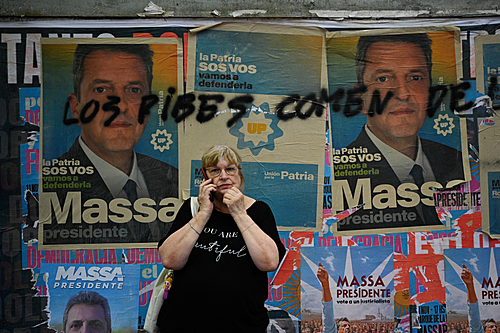
Shortly before the end of voting in the Argentine presidential second round this Sunday (19), the campaigns of Peronist Sergio Massa and ultra-liberal Javier Milei exchanged accusations of rigging the election.
In Tigre, in the province of Buenos Aires, where he votes, Massa’s partner, Malena Galmarini, accused Milei’s campaign of tearing up Peronist ballots in a “systematic way.”
“They accused us of fraud in the first round and those who ripped or tried to tear the transparency of this democratic electoral process are the ones who accused us,” said Galmarini, who is one of the main leaders of Massa’s campaign.
Malena Galmarine and her son Tomáz listen to Sergio Massa speak after voting, this Sunday / AFP
Earlier, Karina Milei, Javier Milei’s sister and coordinator of the far-right campaign, informed the Electoral Court that old ballots were given to her brother’s voters, which would invalidate the vote.
In Massa’s campaign bunker, the fear is that the issue of fraud will gain importance after the winner is announced, regardless of the winner. Argentina did not use electronic voting machines in this election. The result should be known on Sunday night and made official within 48 hours.
Attendance
The Argentine electoral authority reported that 76% of Argentine voters showed up at the polling stations, a percentage slightly higher than that recorded in the first round (74%) at the close of voting. Subsequently, the first round turnout rate was officially set at 77%.
This year’s election, taking place amid a deep crisis, is considered the fiercest in the country’s history, and the outcome could be decided in detail. The campaign led by Massa, current Minister of Economy, bet on voters’ rejection of Milei’s proposals, such as dollarization, the closure of the Central Bank and the exit from Mercosur. When voting, the candidate emphasized that Argentina needs to enter a new phase, highlighting the need for “good will, intelligence and capacity, in addition to the dialogue and consensus that are essential for our country to follow a more virtuous path.”
Milei emphasized Massa’s responsibility for the economic problems and the need to alter the country’s political course, historically limited to the alternation of power between Peronists and radicals, a dynamic that was challenged by Milei’s rise. “We hope that tomorrow (20) brings more hope than continuity and decay. That we have a new president elected tonight,” he declared.
Despite the intense and polarized campaign, including unproven accusations of unreliability in the electoral system by Milei’s campaign, the vote took place without serious incident. The only notable incident was the arrest of a 16-year-old teenager in Buenos Aires, accused of stealing ballots to harm the ultra-liberal candidate.
Editing: Rodrigo Durão Coelho

Source: www.brasildefato.com.br

